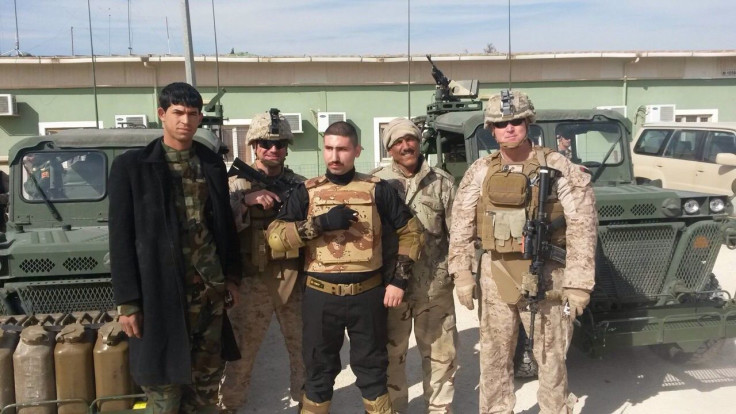Iraq Pins Hopes Of Retaking Ramadi On Newly Trained Sunni Fighters

Faced with the sobering reality that the Islamic State group has seized critical momentum in widening territory in Iraq and Syria, the Iraqi government and its American allies have unleashed a new fighting force aimed at halting its advance: Sunni fighters, armed with American weapons and fresh from training by U.S. and Iraqi military advisors, are being deployed with the objective of pushing the militants out of Anbar province in western Iraq.
But even before the mission gets under way, the Sunni fighters confront substantial doubts about their effectiveness, say members of the Iraqi security forces responsible for training new classes of fighters. Largely untested, their presence speaks to the absence of another force that brings far more experience -- Shiite militias that played a key part in routing the Islamic State group, better known as ISIS, at the battle for Tikrit earlier this year. The Shiites, while involved in the fighting in Anbar, have taken a back seat. The Iraqi security forces and Sunni tribesmen are leading the fight instead.
For Iraq’s government, the new reliance on Sunni fighters amounts to the latest strategy in what has so far been a failed effort to roll back and contain ISIS. As the militants captured the capital of Anbar, the city of Ramadi, two weeks ago, the Iraqi security forces beat a hasty retreat to the outskirts of Baghdad, with no orders about what to do next, said Sunni tribal leaders in Anbar.
That defeat underscored growing doubts that the Iraqi military will be able to realize its long-promised goal to retake the northern Iraqi city of Mosul, whose fall to ISIS last year heralded the rise of the militant army. When the government’s forces managed to retake Tikrit last month -- a landmark on the road to Mosul -- they did so only with the assistance of Shiite-dominated militias known as Hashd al Shabi, or Popular Mobilization Committees.
But those Shiite militias aren’t going to be leading the charge on Ramadi, which sits in the middle of a Sunni-dominated territory where they are not welcome. And the precedent seen in Tikrit, where Sunni and Shia could not establish any coordination or joint command structure, means Sunnis untested in battle are going it alone, with less chance of success.
Shiite volunteers who tried to help retake Ramadi in the days following its fall did little to help the local fighters on the front line, Sunni tribesmen there told International Business Times. In fact, some of those Shiites suspected that some Sunni tribes were actually aiding ISIS, not helping defeat it.
Those suspicions jibe with what officials in the city said in recent interviews with IBTimes. Some Sunni tribal leaders, they said, helped ISIS take Ramadi by providing it with intelligence, cash and weapons, which assisted directly in the militants’ seizure of a large part of the province that lies directly west of Baghdad.
In the wake of the Ramadi defeat, the Baghdad government decided that it needed a new force, allied with the wealthy Sunni tribesmen that govern Anbar and provided with the heavy weapons needed to take on the disciplined, well-armed ISIS fighters. So it began training Sunni volunteers at the Habbaniyah military base on the outskirts of Ramadi, who would also be paid a salary. The number of soldiers in the new Sunni fighting outfit is still unclear, though some locals from Ramadi told IBTimes that there were up to 300 trained men.
The Iraqi government spearheaded the training program also because it wanted more control over the forces fighting ISIS in Anbar province. In an interview with the BBC on Monday, Iraq's parliamentary speaker Salim al-Jabouri said the prime minister could not control the Shiite fighters in Ramadi because they did not take orders from him.
That gap in communication and command affected the outcome of the battles in Tikrit, where the Shiite volunteer forces, largely backed by Iran, managed themselves and only rarely consulted with the army and police. They had no direct contact with the U.S.-led coalition either, and were not aware of where the coalition planned to target ISIS in airstrikes.
The same miscommunication and disagreements played a part in the rout of Iraqi forces in Anbar, according to Sunni tribal fighters in Ramadi. Now, as they try and mobilize to retake lost ground, Sunni tribesmen in Anbar say they are not optimistic that the forces can work together efficiently, especially without more help from Baghdad.
"The government did not pay the salaries for [the fighters in Ramadi] for more than four months," said Hathal al Fahdawi, a member of Anbar's provincial council, in a recent interview with IBTimes following the fall of Ramadi. "Plus the government gave no support or reinforcements and no weapons or ammunition."
There is also concern among U.S. and Iraqi military advisors that the effort to train a new class of Sunni fighters could fail, like a previous effort to train Sunnis did, earlier this year.
Using the blueprint of the “Sunni Awakening” strategy in 2007, when the U.S. funneled arms to Sunni tribes in western Iraq to fight al Qaeda, Washington tried to replicate that model against ISIS. But that strategy is currently in tatters, because the weapons the U.S. promised never made it into the hands of the tribes in Anbar, local leaders told IBTimes.
© Copyright IBTimes 2024. All rights reserved.





















